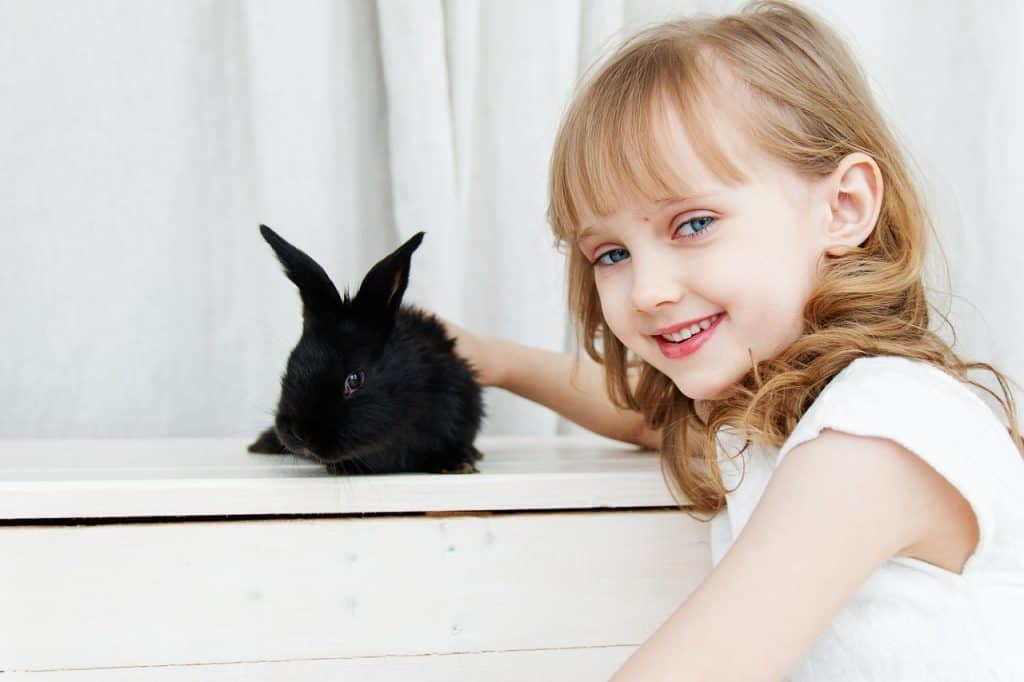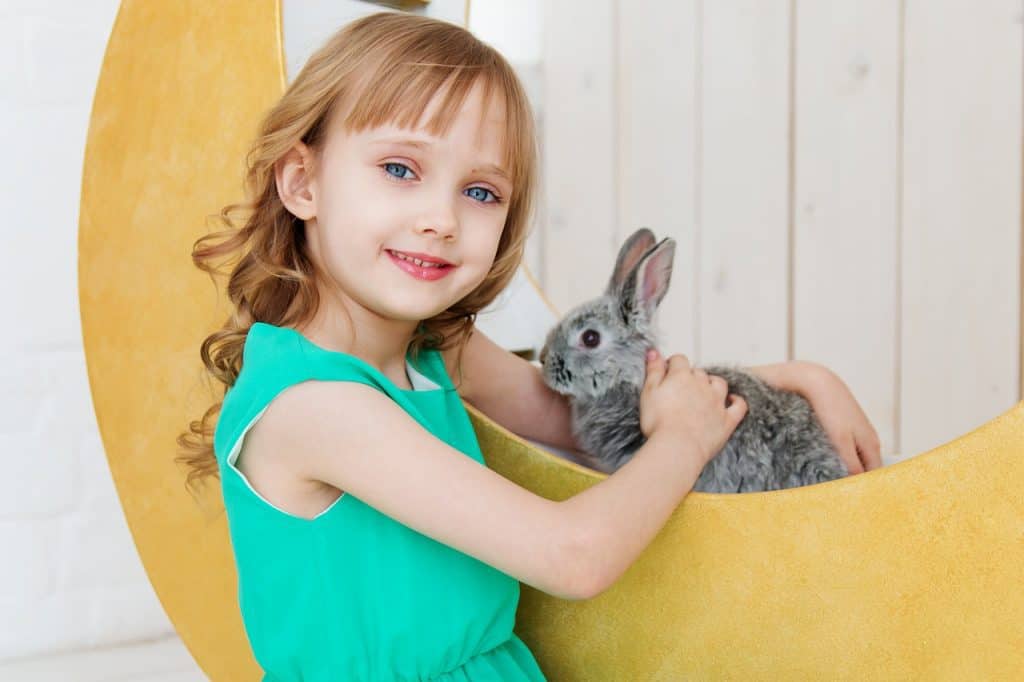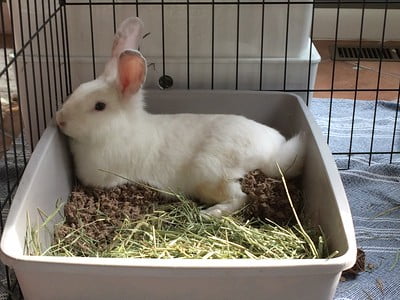Last Updated on February 19, 2023 by Marjon Ramos
You can convince your parents to get a bunny by knowing your parents’ reason for why they’re against it. You can then formulate a plan that solves their concerns and meet them halfway.
Rabbits are huge commitments that require a lot of time, money, space, and effort for them to be truly happy. No one should get a rabbit without first thinking it through.
Now that I’ve given you the gist of the article, read on as I explain in more detail how to convince your parents to get a bunny:
Table of Contents
Reasons why your parents are hesitant to get a rabbit.

In order for you to properly convince your parents to get you a bunny, you must first see and understand why they are hesitant in the first place.
Here are the most common reasons why your parents are hesitant to get you a rabbit:
1. Rabbits cost money.
Rabbits eat a lot. While it would depend on your rabbit’s breed, the typical cost of food for a medium-sized rabbit is $40–$90 per month.
This amount is highly dependent on where you get your food, though. The amount I mentioned above is only applicable if you buy your rabbit food at farms and markets in bulk.
If you’re planning on buying your rabbit’s food in retail stores or on Amazon, the cost would be way higher than $40–$90 per month. Your rabbit would require a variety of vegetables, a steady supply of hay, and some treats per month.
Also, your rabbits will need to have regular check-ups if you want them to be as healthy as possible. You might need to pay more because rabbits are not typical pets. You would need to find a veterinarian that specialized in rabbits.
Finally, you will need to get your rabbits neutered. A rabbit that’s not neutered is not a good pet. Unneutered rabbits spray pee everywhere and would get territorial after reaching sexual maturity.
2. Rabbits need a lot of space.
Contrary to popular belief, rabbits are not meant to be kept in small cages. Rabbit experts concludes that the best environments for rabbits are those that closely resemble what they have in the wild.
Wild rabbits are made to wander and explore. If you keep your rabbits in small cages for long periods of time, they will eventually get depressed.
A rabbit should be free-roaming around the house. Your parents might not be keen on having a rabbit running freely around your house. Rabbits also chew on things like furniture.
3. Rabbits require a lot of time and effort.
Contrary to popular belief, rabbits are not easy to take care of. Rabbits are, in my opinion, harder to take care of than dogs.
You will need to feed them regularly because not doing so could trigger a bout of dangerous digestive problems like GI stasis. Some rabbits could develop GI stasis if not fed in as early as 12 hours.
Rabbits also require regular exercise. Rabbits are made to wander and explore. Keeping a rabbit in a cage for too long without regular exercise could lead to depression.
A depressed rabbit could stop eating, which in turn could lead to GI stasis.
Also, a rabbit’s diet should be monitored closely. Rabbits are extremely susceptible to a wide range of digestive problems if fed the wrong diet.
Finally, you will need to litter train your rabbits if you don’t want them to poop everywhere and spray urine.
Litter training a rabbit would require a lot of time depending on your rabbit’s personality as well as how experienced you are at training rabbits.
4. Rabbits are a big commitment.
Rabbits have a life span of 8–12 years if taken care of properly. Your parents might be hesitant to spend money for that long.
Also, your parents might not believe you are responsible enough to take care of a living creature for that long.
They might be afraid that you’re just going to abandon it and pass the responsibility on to them when they themselves are hesitant to do so.
Finally, your parents might have read somewhere that rabbits are the most abandoned pets in shelters, which is true. They might be afraid that you’ll do the same.
5. Rabbits can cause allergies.
Rabbits shed a lot. Their hair might cause allergies for someone from your house.
Your parents might be hesitant to get one because they’re afraid you or someone in your family is allergic to it.
6. You might already have pets that are not compatible with rabbits.
Rabbits, being prey creatures, would most likely get scared of your other pets, like dogs or cats.
Your parents might be worried that your other pets would hurt the rabbit, given that both cats and dogs are natural predators of rabbits.
How to get your parents to say yes to getting a rabbit?

Now that you know the possible reasons why your parents might be hesitant to say “yes” to getting a pet rabbit, it’s now time to formulate a strategy that would give you the best chance of getting that approval:
1. Know your parents’ concerns.
The first thing you should do in order to convince your parents to get you a pet rabbit is to know what their concerns are.
You should talk to them in a relaxed manner and ask them why they think it’s a bad idea.
Whether you like it or not, your parents have more life experience than you.
They likely experienced something that would make them turn down your proposal of getting a rabbit. I mean, how could anyone resist those cute creatures?
2. Find ways to address your parents’ concerns.
After hearing your parent’s concerns about why they’re against getting a pet rabbit, it’s time to do your research. Plan out every detail of how you’re going to solve those problems they laid out.
3. Practice what you’re going to say.
After doing your research, practice what you’re going to say. It’s much better to know exactly what you’re going to say so that if things get heated, you can remain calm — which is the most important step in this process.
4. Do not argue and accept their decision.
If your parents deny your request, you should never argue with them and just accept their decision.
Arguing would only show them that you’re not mature enough to take care of a rabbit, which can be frustrating sometimes.
5. Look for compromises.
You should instead go back to the drawing board and look for compromises. Meet your parents halfway and find a scenario where you both win.
It could be in the form of some kind of promise you should keep. For example, if your parents are hesitant due to the amount of poop rabbits produce, you could offer to clean it up every day.
6. Show them that you’re responsible and committed.
It’s now time to prove yourself and show them that you’re ready and responsible enough to take care of a rabbit. As I said earlier, rabbits are a HUGE commitment. It’s like signing an 8-year contract.
You can start small and show initiative with your homework and chores.
Remember, consistency is key. If you quit after a few months, it would only convey the message that you’re not responsible and committed to this whole thing.
7. Give your parents time to think it over.
Give your parents some space and time to think it over. As I said earlier, rabbits are a huge commitment. You or anyone should never get one without thinking it over.
Conclusion
To get your parents to say “yes” to getting a rabbit, you must first know why they’re against it in the first place. You can then formulate a plan based on that information.
If your parents are concerned about the huge responsibility (which is true) of taking care of rabbits, you should show your parents that you’re responsible enough to get one and meet your parents halfway if they offer any compromises.
Cite this article:




